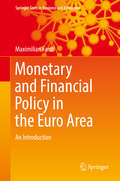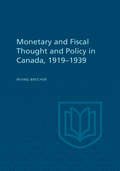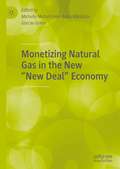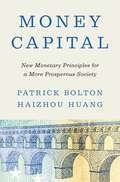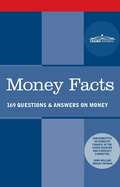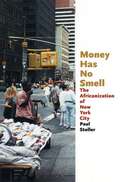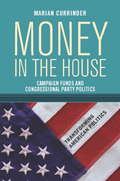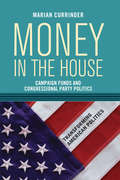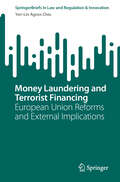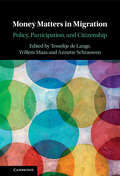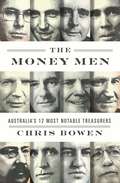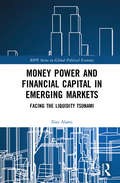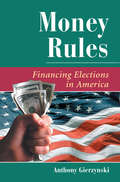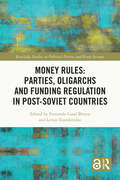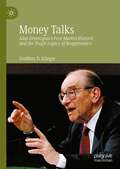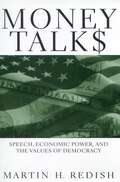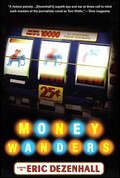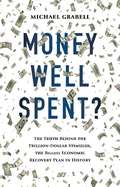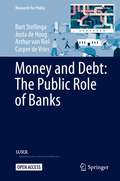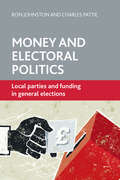- Table View
- List View
Monetary and Financial Policy in the Euro Area: An Introduction (Springer Texts in Business and Economics)
by Maximilian FandlThis textbook provides a comprehensive overview of monetary policy, banking supervision and financial stability in the euro area. The author uses his professional experience in central banking to provide a thorough understanding of European economics and to explore how the monetary and financial system functions. The book takes into account the profound changes that resulted from crisis developments in recent years, such as the implementation of quantitative easing or the establishment of the Single Supervisory Mechanism (SSM). The author also invites readers to develop their thoughts on alternative policies to shape the monetary and financial system of the future. The textbook is tailor-made for intermediate courses in economics but will also appeal to those preparing a career in central banking or financial regulation.
Monetary and Fiscal Policy Options for Dealing with External Shocks: Insights from the GIMF for Colombia
by Benedict Clements Daniel Leigh Enrique FloresA report from the International Monetary Fund.
Monetary and Fiscal Thought and Policy in Canada, 1919-1939
by Irving BrecherIn this careful and thorough study of a Canadian field which has been relatively untouched in recent years, Dr. Brecher records and comments on the development of monetary and fiscal thinking in Canada in the inter-war period, and its impact on public policy in the federal sphere. Examining Canadian opinion about economic theory during this time, the author draws on four fields of thought: that of government and other public officials; of businessmen, such as bankers, and their views on what should be done about the depression; of the "radical group", such as those prominent in the formation of the CCF and Social Credit parties; and of economists, prominent in the universities.Dr. Brecher points out in his preface that his inquiry is rooted in the conviction that the problems associated with cyclical fluctuations remain sufficiently complex to make an understanding of the developments of the twenties and thirties an indispensable condition for effective stabilization policy. He finds the twenties distinguished only in the superficial and imperfect diagnosis of and remedial suggestions for unemployment, made chiefly by a relatively small handful of thinkers associated with the Progressive and United Farmers movements, then emerging in the West. It was the thirties which, under the impact of the depression, witnessed the first real stirrings of careful economic analysis in cyclical terms, and of statistical techniques for measuring the value of annual productive activity and income receipts in the Dominion.The author has attempted to appraise the evolution of the Canadian policy of monetary and fiscal stabilization within the thought environment in which it was conceived and implemented, and on the basis of the standards set by modern income-employment theory.
Monetizing Natural Gas in the New “New Deal” Economy
by Michelle Michot Foss Anna Mikulska Gürcan GülenNatural gas markets have undergone momentous changes, worldwide. This book updates and expands on the dynamics, performance and forward path of expanding natural gas use in the US and worldwide, including international trade. It brings together major research themes and findings with recent updates and analysis of new trends and developments. It also explores many considerations for natural gas market development, such as the importance of infrastructure, transparent pricing, and institutional capacity. This book is unique in providing background on the full natural gas value chain as well as information and analysis that can foster scenario-building and decision-making. Of particular value are the lessons learned and demonstrated for those countries that aspire to build effective natural gas markets and to expand natural gas development and use.
Money Capital: New Monetary Principles for a More Prosperous Society
by Patrick Bolton Haizhou HuangA novel perspective on monetary and fiscal policy that views money as the equity capital of a nationA conventional economic theory, monetarism, holds that inflation is a monetary phenomenon driven by changes in the supply of money. Yet recent experience—including the aftermath of the financial crisis of 2008 and the economic development of China—contradict this basic prediction. In this book, leading economists Patrick Bolton and Haizhou Huang offer a novel perspective, viewing monetary economics through the lens of corporate finance. They propose a richer theory, where money can be seen as the equity capital of a nation, playing a similar role as stocks for a company. This innovative framework integrates the real and monetary sides of the economy, with a banking sector and debt at its core.In the financial world, companies issue new shares only if it results in some kind of value creation; this is a basic principle of corporate finance that Bolton and Huang argue can be applied to monetary economics. When the government increases the money supply to finance positive net value investments—when it prints money to keep the economy going—it increases output, not inflation. This is evidenced by the strong growth in GDP and money in China over the last four decades, and in the United States during World War II. The effect of increasing money supply, they argue, depends on how money enters the system and what the money buys. The principles outlined by Bolton and Huang shed new light on a range of issues, including inflation, monetary and fiscal policy, central banking, money and growth, and the international monetary system.
Money Facts: 169 Questions & Answers on Money
by Subcommittee on Domestic FinanceThe meaning of money, how it was created, and how it influenced everyday life for Americans inspired Wright Patman throughout his professional life as a Congressman from 1928 to 1975, as chairman of the powerful United States House Committee on Banking and Currency from 1963 to 1975 and a life-long populist in the good sense of the word. He defended the little guy, farmers, veterans and small businessmen against big business, big chain stores, big banks and especially the Federal Reserve system. Together with his Subcommittee on Domestic Finance, Patman released in 1964 A Primer on Money explaining how the US monetary system works and indicated where it needed reform. As a supplement to that report, he released Money Facts—169 Questions and Answers on Money, which is designed to highlight in question and answer form the basic points brought out in A Primer on Money. It answers, for example, what money is: “Money is anything that people will accept in exchange for goods or services, in the belief that they may, in turn, exchange it, now or later, for other goods or services,”, but it also raises many other questions such as: - Who issues currency? - What is a central bank? - What is active monetary policy? - What is the main problem of the Federal Reserve System? Although this publication is over fifty years old, and some changes have been made to the Federal Reserve System since then, this booklet is still relevant and important to understand more about the history and meaning of money and how the Federal Reserve System plays a crucial role in the US economy. This report is interesting reading for students of monetary policy, academics, policymakers, journalists, and anyone interested to learn about the basics of money and the monetary system.
Money Has No Smell: The Africanization of New York City
by Paul StollerIn February 1999 the tragic New York City police shooting of Amadou Diallo, an unarmed street vendor from Guinea, brought into focus the existence of West African merchants in urban America. In Money Has No Smell, Paul Stoller offers us a more complete portrait of the complex lives of West African immigrants like Diallo, a portrait based on years of research Stoller conducted on the streets of New York City during the 1990s. Blending fascinating ethnographic description with incisive social analysis, Stoller shows how these savvy West African entrepreneurs have built cohesive and effective multinational trading networks, in part through selling a simulated Africa to African Americans. These and other networks set up by the traders, along with their faith as devout Muslims, help them cope with the formidable state regulations and personal challenges they face in America. As Stoller demonstrates, the stories of these West African traders illustrate and illuminate ongoing debates about globalization, the informal economy, and the changing nature of American communities.
Money In the House
by CurrinderParty leaders in the US House of Representatives are expected to raise tremendous amounts of money for congressional campaign committees and for other party candidates and the ability to do so has become a key factor in the gaining and maintaining leadership positions within the House. Currinder (Government Affairs Institute, Georgetown U. ) explores how this system came to be following reforms in the 1970s and considers its implications for Congressional politics. He presents a theory of the relationship between House members and the congressional party organizations that rests on the idea that when partisan margins are small and power is centralized in the leadership, party leaders are better able to distribute money to satisfy party goals, but that when the opposite holds, House members can redistribute money so as to satisfy their individual agendas. He then examines this theory against the evolution of Congress from the 1970s reforms through the election of Nancy Pelosi as House Speaker. Annotation ©2008 Book News, Inc. , Portland, OR (booknews. com)
Money In the House
by CurrinderMoney in the House provides a compelling look at how the drive to raise campaign money has come to dominate congressional party politics. Author Marian Currinder examines the rise of member-to-member and member-to-party giving as part of a broader process that encourages ambitious House members to compete for power by raising money for the party and its candidates. As the margin between parties in the House has narrowed, the political environment has become fiercely competitive. Because electoral success is largely equated with fundraising success, the party that raises the most money is at a distinct advantage. In addition to relying on outside interests and individuals for campaign contributions, the congressional parties increasingly call on their own members to give for the good of the whole. As a result, lawmakers must devote ever-increasing amounts of time to fundraising. The fundraising expectations for members who wish to advance in the chamber are even higher. By requiring their members to raise and redistribute tremendous amounts of money in order to gain power in the chamber, the parties benefit from their members' ambitious pursuits. Currinder argues that the new "rule of money" is fundamentally altering the way House members pursue power and the way congressional parties define and reward loyalty. Contents 1. Introduction: Redistributing Campaign Funds and Congressional Party Politics 2. Pursuing Ambition in a Parties Framework 3. The 1970s Reform Era: The Money Chase Begins 4. The 1980s: New Directions in Campaign Funding 5. A Republican Revolution in Politics and Money 6. Redistributing Campaign Money in a New Era
Money In the House
by Marian CurrinderMoney in the House provides a compelling look at how the drive to raise campaign money has come to dominate congressional party politics. Author Marian Currinder examines the rise of member-to-member and member-to-party giving as part of a broader process that encourages ambitious House members to compete for power by raising money for the party and its candidates. As the margin between parties in the House has narrowed, the political environment has become fiercely competitive. Because electoral success is largely equated with fundraising success, the party that raises the most money is at a distinct advantage. In addition to relying on outside interests and individuals for campaign contributions, the congressional parties increasingly call on their own members to give for the good of the whole. As a result, lawmakers must devote ever-increasing amounts of time to fundraising. The fundraising expectations for members who wish to advance in the chamber are even higher. By requiring their members to raise and redistribute tremendous amounts of money in order to gain power in the chamber, the parties benefit from their members' ambitious pursuits. Currinder argues that the new "rule of money" is fundamentally altering the way House members pursue power and the way congressional parties define and reward loyalty. Contents1. Introduction: Redistributing Campaign Funds and Congressional Party Politics 2. Pursuing Ambition in a Parties Framework 3. The 1970s Reform Era: The Money Chase Begins 4. The 1980s: New Directions in Campaign Funding 5. A Republican Revolution in Politics and Money 6. Redistributing Campaign Money in a New Era
Money In the House
by Marian CurrinderMoney in the House provides a compelling look at how the drive to raise campaign money has come to dominate congressional party politics. Author Marian Currinder examines the rise of member-to-member and member-to-party giving as part of a broader process that encourages ambitious House members to compete for power by raising money for the party and its candidates. As the margin between parties in the House has narrowed, the political environment has become fiercely competitive. Because electoral success is largely equated with fundraising success, the party that raises the most money is at a distinct advantage. In addition to relying on outside interests and individuals for campaign contributions, the congressional parties increasingly call on their own members to give for the good of the whole. As a result, lawmakers must devote ever-increasing amounts of time to fundraising. The fundraising expectations for members who wish to advance in the chamber are even higher. By requiring their members to raise and redistribute tremendous amounts of money in order to gain power in the chamber, the parties benefit from their members' ambitious pursuits. Currinder argues that the new "rule of money" is fundamentally altering the way House members pursue power and the way congressional parties define and reward loyalty. Contents1. Introduction: Redistributing Campaign Funds and Congressional Party Politics 2. Pursuing Ambition in a Parties Framework 3. The 1970s Reform Era: The Money Chase Begins 4. The 1980s: New Directions in Campaign Funding 5. A Republican Revolution in Politics and Money 6. Redistributing Campaign Money in a New Era
Money In the House: Campaign Funds and Congressional Party Politics
by Marian CurrinderMoney in the House provides a compelling look at how the drive to raise campaign money has come to dominate congressional party politics. Author Marian Currinder examines the rise of member-to-member and member-to-party giving as part of a broader process that encourages ambitious House members to compete for power by raising money for the party and its candidates. As the margin between parties in the House has narrowed, the political environment has become fiercely competitive. Because electoral success is largely equated with fundraising success, the party that raises the most money is at a distinct advantage. In addition to relying on outside interests and individuals for campaign contributions, the congressional parties increasingly call on their own members to give for the good of the whole. As a result, lawmakers must devote ever-increasing amounts of time to fundraising. The fundraising expectations for members who wish to advance in the chamber are even higher. By requiring their members to raise and redistribute tremendous amounts of money in order to gain power in the chamber, the parties benefit from their members' ambitious pursuits. Currinder argues that the new 'rule of money' is fundamentally altering the way House members pursue power and the way congressional parties define and reward loyalty.
Money Laundering and Terrorist Financing: European Union Reforms and External Implications (SpringerBriefs in Law)
by Yen-Lin Agnes ChiuThis book delves into the EU&’s latest reform package dealing with anti-money laundering and countering the financing of terrorism. It carves out the essence of groundbreaking initiatives adopted in 2024 with a focus on their outward implications for the wider world. Offering unique perspectives from an external point of view, the study applies a combined methodology, including geographic, historic, teleological, systematic and comparative dimensions. The findings are presented in a concise manner with visual designs that make the timely topic accessible to readers from various backgrounds.
Money Matters in Migration: Policy, Participation, and Citizenship
by Willem Maas Tesseltje De Lange Annette SchrauwenMigration, participation, and citizenship, are central political and social concerns, are deeply affected by money. The role of money - tangible, intangible, conceptual, and as a policy tool - is understudied, overlooked, and analytically underdeveloped. For sending and receiving societies, migrants, their families, employers, NGOs, or private institutions, money defines the border, inclusion or exclusion, opportunity structures, and equality or the lack thereof. Through the analytical lens of money, the chapters in this book expose hidden and sometimes contradictory policy objectives, unwanted consequences, and inconsistent regulatory structures. The authors from a range of fields provide multiple perspectives on how money shapes decisions from all actors in migration trajectories, from micro to macro level. Taking an interdisciplinary approach, the book draws on case studies from Europe, the Americas, Asia, and Africa. This comprehensive overview brings to light the deep global impacts money has on migration and citizenship.
Money Men: Australia's Twelve Most Notable Treasurers
by Chris BowenHow much do we know about the second most important office in the nation? Who was Australia's first treasurer? Who resigned because of a relationship breakdown with the PM? And who did Frank Hardy base his character Ted Thurgood in Power without Glory on? The Money Men is the first in-depth look at the twelve most notable and interesting men to have held the office of Treasurer of Australia. Former Treasurer Chris Bowen brings a unique insider perspective to the lessons learned from the successes and failures of those who went before him. Who does Chris Bowen think has been Australia's most exceptional Treasurer? With revealing interviews of the five last treasurers, The Money Men dares to answer that question.
Money Power and Financial Capital in Emerging Markets: Facing the Liquidity Tsunami (RIPE Series in Global Political Economy)
by Ilias AlamiThis book provides a comprehensive investigation of the messy and crisis-ridden relationship between the operations of capitalist finance, global capital flows, and state power in emerging markets. The politics, drivers of emergence, and diversity of these myriad forms of state power are explored in light of the positionality of emerging markets within the network of space and power relations that characterises contemporary global finance. The book develops a multi-disciplinary perspective and combines insights from Marxist political economy, post-Keynesian economics, economic geography, and postcolonial and feminist International Political Economy. Alami comprehensively reviews the theories, histories, and geographies of cross-border finance management, and develops a conceptual framework which allows unpacking the complex entanglement of constraint and opportunities, of growing integration and tight discipline, that cross-border finance represents for emerging markets. Extensive fieldwork research provides an in-depth comparative critical interrogation of the policies and regulations deployed in Brazil and South Africa. This volume will be especially useful to those researching and working in the areas of international political economy, contemporary geographies of money and finance, and critical development studies. It should also prove of interest to policy makers, practitioners, and activists concerned with the relation between finance and development in emerging markets and beyond.
Money Rules: Financing Elections in America (Dilemmas in American Politics)
by Anthony GierzynskiThe role of money in the U.S. electoral process has become more and more controversial in recent years. Following the Buckley ruling and other legislation in 1996, candidates and political parties are free to raise virtually unlimited “soft” money, making money perhaps the most significant factor in a campaign's success. In Money Rules , Anthony Gierzynski theorizes that, under our current system of financing elections, our political process has tilted too far in favor of political freedom , at the expense of political equality . Gierzynski examines the historical roots of the campaign finance dilemma, demonstrates its effects on the local, state, and national levels, and projects the long-term outcomes for American politics.
Money Rules: Parties, Oligarchs and Funding Regulation in Post-Soviet Countries (Routledge Studies on Political Parties and Party Systems)
by Fernando Casal Bértoa Levan TsutskiridzeThis book provides a comprehensive overview of the regulation of party finance in post-Soviet countries by leading academics and practitioners in the field.Through a series of cutting-edge chapters, using both original quantitative and qualitative data, it systematically sheds theoretical and empirical light on the way party funding regulation has evolved since the fall of the Soviet Union in 1991, as well as on the manner in which the legal regulation of party finances has had an impact (or not) on the evolution of party politics and democratic consolidation in the region. The book examines regulation in post-Soviet countries like Armenia, Georgia, Kazakhstan, Kyrgyzstan, Moldova, Mongolia, Russia and Ukraine. In analysing the various dimensions of party funding regulation and their impact on political parties, party systems and democracy, it looks at the past and future, and makes recommendations on how legislation could be improved in order to further party development, party system stabilisation and democratic consolidation for all the countries in the region.This book will be of key interest to scholars, students, practitioners and journalists interested in political party finance and anti-corruption, and more broadly to political parties, democracy and democratic governance, and post-Soviet/Russian and East European politics.
Money Talks: Alan Greenspan's Free Market Rhetoric and the Tragic Legacy of Reaganomics (Palgrave Studies In The History Of Economic Thought Ser.)
by Jennifer Adams Kevin Howley Geoffrey D. KlingerThis book explores the American freemarket economy, espoused by Alan Greenspan, the longtime chairman of the Federal Reserve, through decoding the discourse of economics. Combining an analysis of both economics and language, the legacy of Reaganomics is examined in relation to economic inequality, fiscal policy, public discourse, and the moral economy. How notions of easy money, conspicuous consumption, and unlimited economic growth were harnessed to justify the Free Market revolution is also discussed.This book aims to highlight the drivers of modern inequality and economic distress. It will be relevant to students and researchers interested in the history of economic thought and economic discourse.
Money Talks: Speech, Economic Power, and the Values of Democracy
by Martin H. RedishMany have argued that soft money and special interests are destroying the American electoral system. And yet the clarion call for campaign finance reform only touches on the more general belief that money and economic power have a disastrous impact on both free expression and American democracy. The nation's primary sources of communication, the argument goes, are increasingly controlled by vast corporate empires whose primary, or even exclusive motive is the maximization of profit. And these conglomerates should simply not be granted the same constitutional protection as, say, an individual protester. And yet neither the expenditure of money for expressive purposes nor an underlying motive of profit maximization detracts from the values fostered by such activity, claims Martin H. Redish. In fact, given the modern economic realities that dictate that effective expression virtually requires the expenditure of capital, any restriction of such capital for expressive purposes will necessarily reduce the sum total of available expression. Further, Redish here illustrates, the underlying motive of those who wish to restrict corporate expression is disagreement with the nature of the views they express. Confronting head-on one of the sacred cows of American reformist politics, Martin H. Redish here once again lives up to his reputation as one of America's most original and counterintuitive legal minds.
Money Wanders: A Novel (A PR Crisis Management Mystery)
by Eric DezenhallMoney Wanders from author Eric Dezenhall is a wild and uproarious tour of spin and media manipulation from the lobbied halls of Congress to the dilapidated boardwalk of Atlantic City.Jonah Eastman, disgraced Presidential pollster, is summoned home to Atlantic City by his ailing grandfather Mickey Price--a legendary Atlantic City gangster and owner of the Golden Prospect casino. When Mickey dies, Jonah is "persuaded" by mob boss Mario Vanni to help improve his image by launching a misinformation campaign aimed at gaining public acceptance and ultimately a way "outta the life."So Jonah goes to war through a comical and audacious manipulation of the media which includes online rumoring, exploiting romantic myths of the mob, and orchestrating a union-backed pseudo-vigil after Vanni is arrested. To pull off these stunts, he enlists the help of his grandfather's Prohibition-era cronies, pimply-faced hackers, a disgruntled Secret Service agent, a cagey Washington lobbyist, a slick Philadelphia publicist, and a street-fighting rabbi.
Money Well Spent?: The Truth Behind the Trillion-Dollar Stimulus, the Biggest Economic Recovery Plan in History
by Michael GrabellThe 2012 presidential campaign will, above all else, be a referendum on the Obama administrationOCOs handling of the financial crisis, recalling the period when ObamaOCOs ?audacity of hopeOCO met the austerity of reality. Central to this is the OCOOCOAmerican Recovery and Reinvestment Act of 2009OCOOCO?the largest economic recovery plan in American history. Senator Mitch McConnell gave a taste of the enormity of the money committed: if you had spent $1 million a day since Jesus was born, it still would not add up to the price tag of the stimulus package. A nearly entirely partisan piece of legislation? Democrats voted for it, Republicans against? the story of how the bill was passed and, more importantly, how the money was spent and to what effect, is known barely at all. Stepping outside the political fray, ProPublicaOCOs Michael Grabell offers a perceptive, balanced, and dramatic story of what happened to the tax payersOCO money, pursuing the big question through behind-the-scenes interviews and on-the-ground reporting in more than a dozen states across the country.
Money and Banks in the American Political System
by Kathryn C. LavelleIn Money and Banks in the American Political System, debates over financial politics are woven into the political fabric of the state and contemporary conceptions of the American dream. The author argues that the political sources of instability in finance derive from the nexus between market innovation and regulatory arbitrage. This book explores monetary, fiscal, and regulatory policies within a political culture characterized by the separation of business and state, and mistrust of the concentration of power in any one political or economic institution. The bureaucratic arrangements among the branches of government, the Federal Reserve, executive agencies, and government sponsored enterprises incentivize agencies to compete for budgets, resources, governing authority, and personnel.
Money and Debt: The Public Role of Banks (Research for Policy)
by Arthur van Riel Bart Stellinga Josta de Hoog Casper de VriesThis Open Access book from the Netherlands Scientific Council for Government Policy explains how money creation and banking works, describes the main problems of the current monetary and financial system and discusses several reform options. This book systematically evaluates proposals for fundamental monetary reform, including ideas to separate money and credit by breaking up banks, introducing a central bank digital currency, and introducing public payment banks. By drawing on these plans, the authors suggest several concrete reforms to the current banking system with the aim to ensure that the monetary system remains stable, contributes to the Dutch economy, fairly distributes benefits, costs and risks, and enjoys public legitimacy. This systematic approach, and the accessible way in which the book is written, allows specialized and non-specialised readers to understand the intricacies of money, banking, monetary reform and financial innovation, far beyond the Dutch context.
Money and Electoral Politics: Local Parties and Funding at General Elections
by Ron Johnston Charles PattiePolitical parties are crucial to British democracy, providing the foundations for mobilising voters. Their constituency branches are key links between voters and Parliamentary candidates and their activities require two vital resources – people and money. Much has been written on the decline of party membership but far less on money. In this much-needed new book, Ron Johnston and Charles Pattie use the latest research and hitherto unpublished material to explore financial differences across the UK’s three main parties in the four years leading up to the 2010 General Election. They look at how much local parties raise for election campaigns and find that the more money candidates spend then, the better their performance. Analyses of their annual accounts, however, show that many local parties are unable to raise all of the money that they are entitled to spend on such campaigns. This reveals an unhealthy picture of grassroots party organisation in which the capacity to engage effectively with many voters is concentrated in a relatively small number of constituencies and is likely to remain so. This timely and essential book will make a major contribution to the literature on British elections and parties, especially to continuing debates regarding party funding. It will make important reading for academics, students, politicians, civil servants and others interested in this topic.
